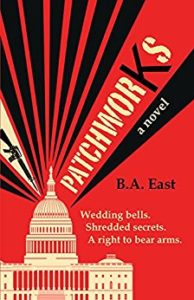Review — PATCHWORKS by B.A. East (Malawi)
 Patchworks
Patchworks
(mystery)
by B.A. East (Malawi 1996-98)
Moonshine Cove Press
September 2017
259 pages
$13.99 paperback, $6.99 Kindle
Reviewed by Peter Van Deekle (Iran, 1968-70)
•
B.A. East brings to his latest and timely novel a refined skill for realistic dialog and a first-hand experience of the federal bureaucracy. This reviewer received his copy of Patchworks on the morning after the Las Vegas massacre in October 2017 with the prophetic statement on its back cover: “America’s next gun massacre is inevitable …”
The 20013 shootings at the Navy Yard facility in Washington, D.C. provide a credible context for this novel’s heightened anxiety over safety and security.
Within that anxiety, East gives readers an engaging narrative centered on two of the novel’s central characters, Gabriel Dunne and Manny Teague. Dunne’s internship in the fictitious Bureau of Government Intelligence and Execution involves him in an investigation of gun violence in America. Gabriel’s academic stipend places him beyond the bureaucratic and fiscal constraints of his fellow Bureau colleagues, among whom he appears almost resolutely and angelically pure. Manny Teague, a devoted father and career employee at the Bureau, becomes at once the agent and the object of a rapidly unfolding tragedy that we largely encounter through Gabriel’s observations.
One can readily associate this novel’s depiction of the petty and futile federal agenda with Joseph Heller’s landmark Catch 22. Both Heller and Best immerse readers in the trivia of life amid the horrors of war and violence. Patchworks represents the modern worksite routine in which “sheltering in place” and “lockdowns” have become commonplace. All this contributes to Gabriel’s frustration as well as his increasing involvement in the lives of those who come to depend upon his sympathetic and supportive contributions.
Author East draws on his considerable diplomatic career experience in providing credible, often outlandish, instances of how the depicted federal employees are absorbed in their individual job security, career advancement and avoidance of substantive recommendations for government action. While the absurdity of the attitudes and actions of each Bureau employee is artfully described, an evolving and ultimately culminating event turns the novel’s hilarity toward the tragic. Amid the plans for a co-worker’s wedding and obsessive security-mandated agency document shredding, guns, gun ownership and gun control emerge as central issues directly and fundamentally impacting all the characters’ lives. The reader is adroitly unprepared by the author for the outcome of events, and East offers a moral perspective via Gabriel’s own thoughts and actions.
Patchworks is sadly a timely tale of national character and individual insight, juxtaposing individual lives and Second Amendment rights. One reads this engaging, often amusing, and ultimately disturbing account in light of an advancing history of public massacres involving firearms.
East compounds the futile absurdity of events through the convoluted bureaucratic norms of his fictitious federal agency. Gabriel finally returns at the novel’s end to his bucolic New England hometown, facing a similar dysfunction within his nuclear family that he encountered among his peers in the Bureau of Government Intelligence and Execution. As depicted here and in much of the gun violence history in the United States, individual actions can profoundly impact many innocent persons.
•
Peter Van Deekle (Iran, 1968-70) began his Peace Corps service informally in the summer of 1963, as a teenage volunteer at headquarters in Washington, D.C. From that time onward he planned to serve abroad, and joined the 20th group of volunteers to Iran in 1968, following graduation from the University of Pennsylvania. He has been an academic administrator in a variety of public and private colleges and universities since his return to the United States and currently, having retired to the Washington, D.C. area where he is the Community News Editor for the National Peace Corps Association’s WorldView magazine. He is also active in the Peace Corps Community for the Support of Refugees and the Museum of the Peace Corps Experience.
No comments yet.
Add your comment